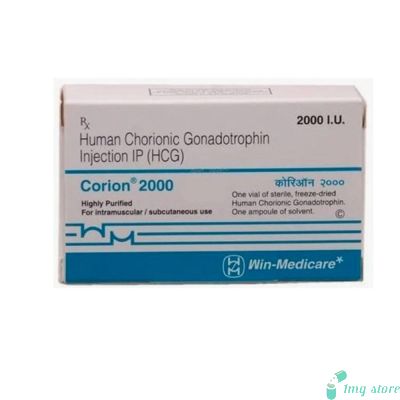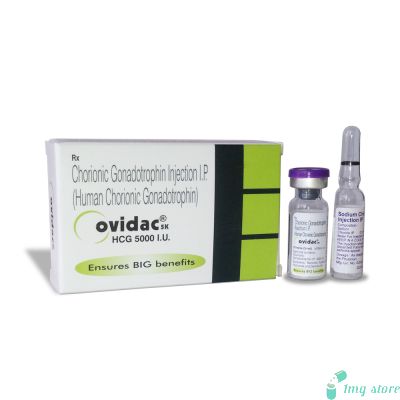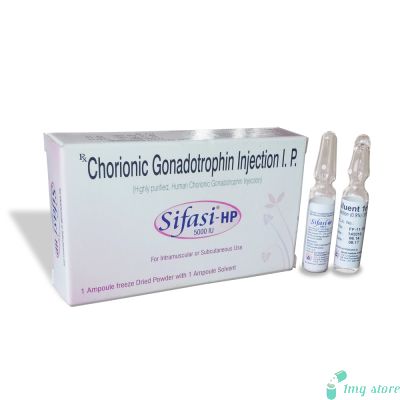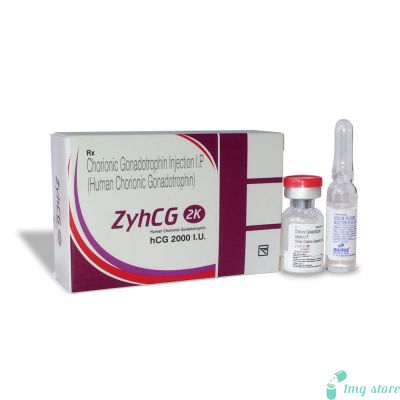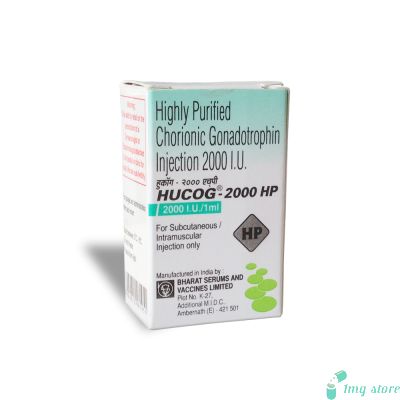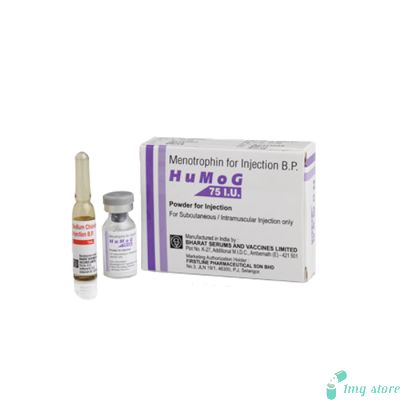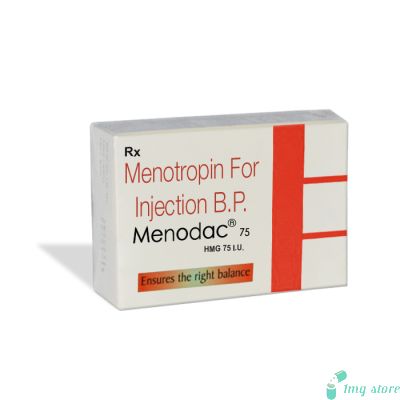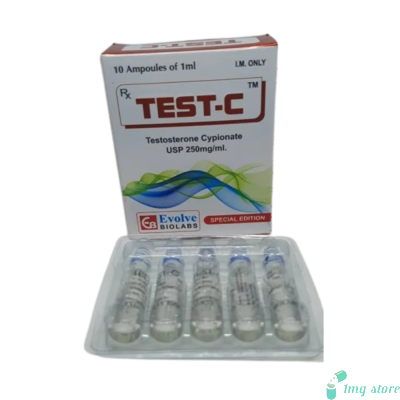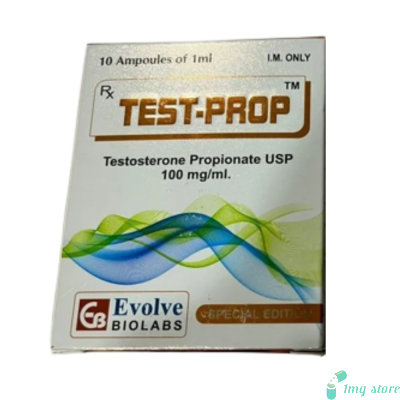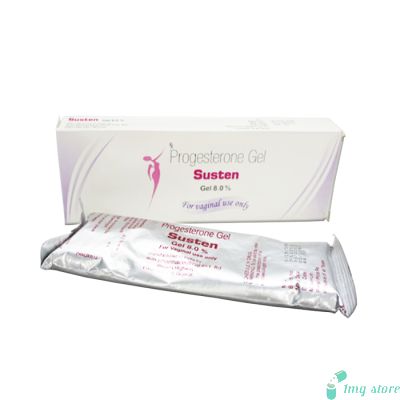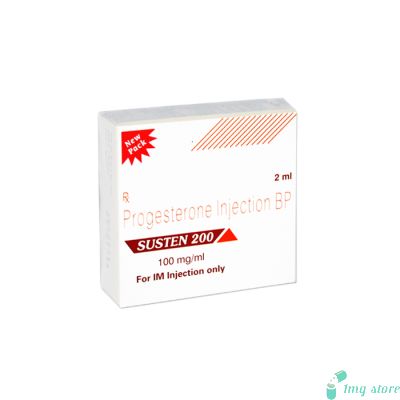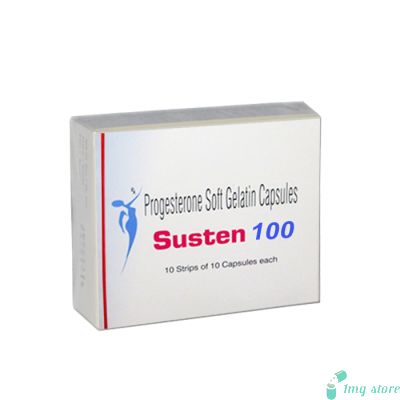Fertigyn HP Injection (Human Chorionic Gonadotropin) (HCG))
Fertigyn (HCG (Human Chorionic Gonadotropin)) Fertigyn HP Injection is a medication used for the treatment of infertility in women and male hypogonadism. In women, it helps by stimulating the release of eggs from the ovary, thereby increasing the chances of successful conception. In men, it works by elevating testosterone levels, which can help with delayed puberty and low sperm count.
Fertigyn HP Injection is a medication that contains Human Chorionic Gonadotropin (HCG) as its active ingredient. HCG is a hormone that is naturally produced by the placenta during pregnancy. In medical terms, it is a glycoprotein hormone that mimics the action of luteinizing hormone (LH) in the body.
Fertigyn HP Injection is commonly used for various purposes, including:
Infertility treatment: It is often prescribed to stimulate ovulation in women who are undergoing assisted reproductive techniques such as in vitro fertilization (IVF) or intrauterine insemination (IUI). HCG helps in the final maturation and release of the eggs from the ovaries.
Hypogonadism treatment: In males, Fertigyn HP Injection is used to treat hypogonadism, a condition where the testes do not produce enough testosterone. It helps to stimulate testosterone production and restore normal levels.
Cryptorchidism treatment: HCG is sometimes used to treat cryptorchidism, a condition in which one or both testes do not descend into the scrotum in male infants.
Weight loss: HCG has been promoted as a weight loss aid, although its effectiveness for this purpose is controversial and not supported by scientific evidence.
Fertigyn HP Injection is typically administered as an intramuscular injection under the supervision of a healthcare professional. The dosage and duration of treatment depend on the specific condition being treated and the individual's response to the medication.
Like any medication, Fertigyn HP Injection may cause side effects such as headache, fatigue, irritability, injection site pain, and allergic reactions in some individuals. It is important to consult a healthcare professional for proper guidance, dosage, and potential risks associated with the use of this medication.
Novarel is a medication that contains Human Chorionic Gonadotropin (HCG) as its active ingredient. HCG is a hormone that is naturally produced by the placenta during pregnancy. Novarel, specifically, is a brand name for HCG that is commonly used for various purposes. While Novarel shares the same active ingredient as Fertigyn HP Injection, it may have slight differences in formulation and usage. Here are some of the potential benefits associated with Novarel:
Ovulation induction: Novarel is often used in fertility treatments to stimulate ovulation in women who are undergoing assisted reproductive techniques such as in vitro fertilization (IVF) or intrauterine insemination (IUI). By triggering the final maturation and release of the eggs from the ovaries, Novarel can help increase the chances of successful conception.
Hormone production: In males, Novarel can be used to treat hypogonadism, a condition characterized by low testosterone levels. By stimulating testosterone production, Novarel helps to restore normal hormone levels, leading to improved symptoms such as low libido, fatigue, and muscle weakness.
Cryptorchidism treatment: Novarel may also be prescribed for the treatment of cryptorchidism in male infants. Cryptorchidism is a condition where one or both testes fail to descend into the scrotum. Novarel can help stimulate the descent of the testes, allowing for proper development and function.
It is important to note that Novarel should only be used under the guidance and supervision of a healthcare professional. The dosage and duration of treatment will depend on the specific condition being treated and the individual's response to the medication. As with any medication, Novarel may have potential side effects, and it is essential to discuss any concerns or questions with a healthcare provider.
When using Fertigyn HP Injection (Human Chorionic Gonadotropin) (HCG) or Novarel fertility medication, it is important to take certain precautions. Here are some key points to keep in mind:
Medical supervision: Both Fertigyn HP Injection and Novarel should be used under the supervision and guidance of a qualified healthcare professional. They are prescription medications and should not be self-administered without proper medical advice.
Allergic reactions: If you have a known allergy to HCG or any other ingredients in the medication, inform your healthcare provider before starting treatment. Allergic reactions can range from mild skin rashes to severe symptoms such as difficulty breathing. Seek immediate medical attention if you experience any signs of an allergic reaction.
Medical history: Inform your healthcare provider about your complete medical history, including any pre-existing conditions or previous allergic reactions. Conditions such as ovarian cysts, hormone-related cancers, asthma, and heart disease may require special consideration when using these medications.
Pregnancy and breastfeeding: Fertigyn HP Injection and Novarel are primarily used in fertility treatments. If you are pregnant or breastfeeding, it is important to discuss the potential risks and benefits of using these medications with your healthcare provider.
Multiple pregnancies: There is a risk of multiple pregnancies (such as twins or triplets) when using Fertigyn HP Injection or Novarel for fertility treatments. Your healthcare provider will closely monitor the treatment to minimize the chances of multiple pregnancies and the associated complications.
Side effects: Like any medication, Fertigyn HP Injection and Novarel may cause side effects. Common side effects may include headache, fatigue, irritability, and injection site pain. It is important to report any persistent or severe side effects to your healthcare provider.
Drug interactions: Inform your healthcare provider about all the medications, supplements, or herbal products you are currently taking. Certain medications may interact with Fertigyn HP Injection or Novarel, potentially affecting their effectiveness or causing adverse effects.
Injection technique: If self-administering the medication, carefully follow the instructions provided by your healthcare provider regarding the correct injection technique. Improper administration can lead to pain, infection, or other complications.
Remember, these precautions are general guidelines, and your healthcare provider will provide specific instructions based on your individual circumstances. Always consult your healthcare provider for personalized advice and guidance regarding the use of Fertigyn HP Injection or Novarel.
Novarel is a medication that contains Human Chorionic Gonadotropin (HCG) as its active ingredient. It is used for various purposes, including:
Ovulation induction: Novarel is commonly used in fertility treatments to stimulate ovulation in women. It helps in the final maturation and release of eggs from the ovaries, increasing the chances of successful conception during assisted reproductive techniques such as in vitro fertilization (IVF) or intrauterine insemination (IUI).
Hypogonadism treatment: Novarel is also used to treat hypogonadism in males. Hypogonadism is a condition where the testes do not produce enough testosterone. Novarel helps to stimulate testosterone production and restore normal hormone levels.
Cryptorchidism treatment: In some cases, Novarel may be prescribed for the treatment of cryptorchidism in male infants. Cryptorchidism is a condition in which one or both testes fail to descend into the scrotum. Novarel can help stimulate the descent of the testes, allowing for proper development and function.
It is important to note that Novarel should only be used under the supervision and guidance of a healthcare professional. The dosage and duration of treatment will depend on the specific condition being treated and the individual's response to the medication. A healthcare provider will assess your situation and determine the appropriate use of Novarel based on your medical history and needs.
Novarel, which contains Human Chorionic Gonadotropin (HCG), may cause certain side effects. It's important to note that not all individuals will experience these side effects, and their severity can vary. Common side effects associated with Novarel may include:
Injection site reactions: Pain, redness, or swelling at the injection site can occur. These reactions are usually mild and temporary.
Headache: Some individuals may experience headaches while using Novarel. These headaches are typically mild and resolve on their own.
Fatigue: Novarel may cause feelings of fatigue or tiredness in some individuals. Adequate rest and maintaining a healthy lifestyle can help manage this side effect.
Irritability: Some people may experience mood changes, such as increased irritability or mood swings, while using Novarel.
Gastrointestinal issues: Digestive disturbances such as nausea, vomiting, or diarrhea may occur as side effects of Novarel. These symptoms are usually mild and resolve on their own.
Ovarian hyperstimulation syndrome (OHSS): OHSS is a rare but potentially serious side effect of Novarel, particularly when used in conjunction with other fertility medications. It is characterized by enlarged ovaries, abdominal pain, fluid retention, and in severe cases, shortness of breath. Immediate medical attention is required if any symptoms of OHSS occur.
It is important to report any persistent or severe side effects to your healthcare provider. They can provide guidance on managing side effects and determine if any further medical intervention is necessary. Remember to consult with your healthcare provider for personalized advice and information about potential side effects specific to your situation.
Q: What is Human Chorionic Gonadotropin (HCG)?
A: Human Chorionic Gonadotropin (HCG) is a hormone produced naturally by the placenta during pregnancy. It plays a crucial role in supporting pregnancy by stimulating the production of progesterone and supporting the development of the embryo.
Q: What is the purpose of using HCG in fertility treatments?
A: HCG is commonly used in fertility treatments to induce ovulation in women. It helps in the final maturation and release of eggs from the ovaries, increasing the chances of successful conception during assisted reproductive techniques such as in vitro fertilization (IVF) or intrauterine insemination (IUI).
Q: Can HCG be used for weight loss?
A: The use of HCG for weight loss is a controversial topic. While some clinics promote HCG injections as a weight loss aid, there is a lack of scientific evidence supporting its effectiveness. It is important to consult with a healthcare professional for safe and evidence-based weight loss approaches.
Q: Are there any side effects of HCG?
A: Like any medication, HCG can cause side effects. Common side effects may include headache, fatigue, irritability, injection site pain, and allergic reactions. It is important to report any persistent or severe side effects to a healthcare professional.
Q: Can HCG interact with other medications?
A: Yes, HCG can interact with certain medications. For example, it may interact with gonadotropin-releasing hormone (GnRH) agonists, thyroid medications, corticosteroids, insulin, and oral antidiabetic medications. It is crucial to inform your healthcare provider about all the medications you are taking to ensure safe and effective treatment.
Q: How is HCG administered?
A: HCG is typically administered as an injection, either subcutaneously (under the skin) or intramuscularly (into the muscle). The specific dosage and administration method will be determined by a healthcare professional based on the individual's condition and treatment plan.
Q: Can HCG be used during pregnancy?
A: HCG is a hormone naturally produced during pregnancy and is not typically used as a medication during pregnancy itself. It is used in specific fertility treatments prior to pregnancy or for other medical purposes as directed by a healthcare professional.
Q: Can I use HCG without a prescription?
A: No, HCG is a prescription medication and should only be used under the supervision and guidance of a qualified healthcare professional. Using HCG without a prescription can be unsafe and may lead to potential risks and complications.
When using Human Chorionic Gonadotropin (HCG), it is important to be aware of potential drug interactions. Drug interactions can occur when two or more medications or substances interact with each other, affecting their effectiveness or causing adverse effects. Here are some examples of drug interactions that may occur with HCG:
Gonadotropin-releasing hormone (GnRH) agonists: Concurrent use of HCG with GnRH agonists, such as leuprolide or goserelin, may enhance the effects of HCG and increase the risk of ovarian hyperstimulation syndrome (OHSS), a potentially serious condition characterized by enlarged ovaries and fluid retention. Close monitoring is necessary when using these medications together.
Clomiphene citrate: Clomiphene citrate is often used in combination with HCG for ovulation induction. The combination of these medications may increase the risk of OHSS. Close monitoring by a healthcare professional is essential.
Thyroid medications: HCG may interact with thyroid medications such as levothyroxine, affecting the effectiveness of thyroid hormone replacement therapy. Dosage adjustments may be necessary, and regular monitoring of thyroid function is important.
Corticosteroids: Concurrent use of corticosteroids, such as prednisone or dexamethasone, with HCG may reduce the effectiveness of HCG. If these medications need to be used together, close monitoring may be required to ensure appropriate response to HCG therapy.
Insulin and oral antidiabetic medications: HCG may have an impact on blood sugar levels. If you are using insulin or oral antidiabetic medications, close monitoring of blood glucose levels is important when using HCG.
Warfarin: HCG may interact with warfarin, a blood-thinning medication, potentially affecting its anticoagulant effects. Regular monitoring of blood clotting parameters is necessary when using these medications together.
These are just a few examples of potential drug interactions with HCG. It is important to inform your healthcare provider about all the medications, supplements, or herbal products you are currently taking before starting HCG therapy. They can provide personalized advice and guidance based on your specific situation and help monitor for any potential interactions.
| Manufacturer | : | Sun Pharma, India |
| Equivalent Brand | : | Novarel |
| Generic Search | : | Human Chorionic Gonadotropin (HCG) |









